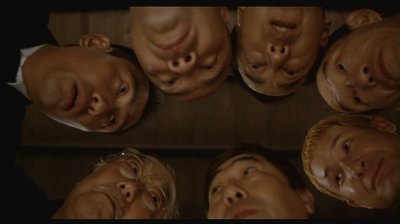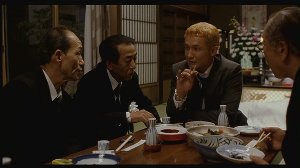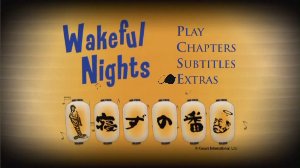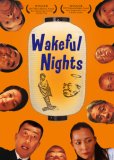| Reviews & Columns |
|
Reviews DVD TV on DVD Blu-ray 4K UHD International DVDs In Theaters Reviews by Studio Video Games Features Collector Series DVDs Easter Egg Database Interviews DVD Talk Radio Feature Articles Columns Anime Talk DVD Savant Horror DVDs The M.O.D. Squad Art House HD Talk Silent DVD
|
DVD Talk Forum |
|
|
| Resources |
|
DVD Price Search Customer Service #'s RCE Info Links |
|
Columns
|
|
|
Wakeful Nights
AnimEigo // Unrated // April 1, 2008
List Price: $24.98 [Buy now and save at Amazon]
Wakeful Nights, a goofy Japanese screwball comedy from director Masahiku Tsugawa, makes light of celebrating death. In all honesty, do we really want a bunch of people standing around shrouded in black clothing as they solemnly sob over our deaths? There's ways of remembering and feeling ardent about a close individual's death without all the bleakness; Tsugawa's film, quite humorously, shows some of the more loony ways to celebrate a loved one's death through song, dance, and storytelling - all done with unabashed vulgarity and quirky character interactions.
The Film:

It all starts, first and foremost, with a most honorable honey pot. Just think about that, for a moment.
Wakeful Nights, based on a story by Ramo Nakajima, tells the story of a masterful rakugo storyteller's death, following a bizarre miscommunication of his final wishes while on his deathbed. He caters to many son-like apprentices to his talents, around six or seven it seems, all of which feel a deep loss at his death. As per their master's wishes, they hold a very private wake. When you mix old friends, drinks, and the mourning of a loved one, you'd expect the typical breakdowns and reminiscent, mildly humorous stories; yet, in Wakeful Nights, each apprentice to the storyteller ends up rustling together a few tales about their experiences with him. It becomes a blend of sobbing in sorrow and squealing in hilarity, all while surfacing the memories they cherish most about their master.
The apprentice's last night with their master turns into a magical, morale-boosting evening filled with good food, great drinks, and fond reminiscence on the antic-filled life of an old artist. However, Wakeful Nights wouldn't be pluralized if there wasn't more than one of said nights; a handful of other wakes take place after the group's initial loss, resulting in similar evenings to the one shared at the loss of their master. Part of the endearment within the film's first two acts sits within their reflection upon their father-figure's passing; the rest of the nights, however, don't hold the same kind of fondness and heart. Each subsequent night feels forced and a bit stranger in tone as they proceed, only existing as a framework for another mosaic of nonsensical, albeit mildly humorous, tales.


Now, the stories that they tell are Wakeful Night's beating heart. They're done in somewhat screwball fashion, blending slapstick and dialogue-driven chaos into a cocktail of zany hilarity. These stories become more and more unbelievable as the night pushes on, but that's to be expected once the sake starts flowing. It's just like most wakes that you've may have been to, only the participants sit next to the body at a traditional Japanese table while sharing some pretty explicative memories. Wakeful Nights can get a bit vulgar - at times a little too vulgar for the speed of the film.
No matter how outlandish the humor gets, Sumio Omori's adapted script never weakens with its entertaining dialogue and bizarre turns of fate. There's a scene at one of the wakes with dueling shamisen (3-stringed Japanese guitar) in which some crude lyrics about genitalia and sex pour out of the two men playing them. Even in this scenario, Wakeful Nights still, somehow, maintains a level of sentimentality about its almost mind-numbing nuttiness. It still flows in robust rhythm, even when the pace of the film's humor leaves its integrity in its dust. This is also a testament to the quality of the film's ensemble cast, which crafts a well-sculpted level of differentiated characters that add spice to the film's static core atmosphere of wakes and memories.
Wakeful Nights is most likely around three-fifths of a heartwarming and hilarious comedy, and the remaining stretch as a repetitive one. It plays its shock cards and plucks at its heart strings early on, leaving the rest of the film floundering about to try and stay fresh and catchy in indistinct fashion. However, that doesn't stop it from being an enjoyably chaotic and joyous reflection on death. To say the least, Wakeful Nights offers a lot of comical lunacy for those open and willing to take its vulgarity down with a dosage of sweet reminiscence.
The DVD


Wakeful Nights comes in a standard keepcase presentation from AnimEigo, adorned with goofy coverart and discart.
The Video:
Visually, there's not a whole lot of intricate design within Wakeful Nights' 1.85:1 image that could be deteriorated within its anamorphic widescreen presentation. Most important to pay attention to in this transfer is flesh tones, ease of seeing facial expressions, and slight differences in drab color replication. This video transfer, though a bit grainy and flat, manages to get all of these points nailed down with a lot of strength. Detail, especially in some of the busier backgrounds, looks quite nice. The print does exhibit a few speckles and a bit of debris here and there. It's a rather dull and dark color palette for a majority of the film, outside of the very occasional splash of baby blue or bright red, but overall the transfer does more than enough to present Wakeful Nights in a very pleasing fashion.
The Audio:
For a Dolby Stereo track, presented in the original Japanese dialect, AnimEigo's disc for Wakeful Nights gets it done there, too. It's not meant to be a very dynamic sounding film, since it is hinged on dialogue and facial nuances, but everything here is actually pretty darn clean. The sporadic singing gets a little scratchy here and there, but not to an overly intrusive level. Granted, I'm using the subtitles for translation purposes, but the language all seemed aptly audible.
Now, the subtitles. There are a few different options, including Full, Limited, and Captions Only. I began watching the film with Full Subtitles, which proved to be a barrage of text. Full subtitles incorporates cultural explanations for some of the language (Brother, Sister, etc), which is mildly informative - but also seem relatively common sense. They also give some translations for the words that are still in Japanese through the regular subtitles, which are a bit more helpful. After around 10 or so minutes, I shifted over to the Limited subtitles since the dizzying amount of letters on-screen really detracts form the film. Subtitles are only available in English, or completely off. For reference, the grammar and flow of the subtitles seemed quite good.
The Extras:
AnimEigo's lined up an interesting, albeit lacking, medley of musical and textual special features to flip through on this disc:
Deleted Scenes:
Seven minutes of deleted scenes are included here, all in non-anamorphic presentation. They are interconnected seamlessly, so its easy to see when each scene begins and ends. Most of the material is very similar to that included in the film, which means that they seem like pacing edits. There's some good material here, including a scene talking about the master's "booty calls".
Additional Songs:
Several alternate (?) songs are included here, though they seem like they might not have been meant for the film. However, it's fitting with the scene featuring the dueling shamisen, so maybe it's an unused variation. A guy and girl perform the song with a shamisen musician playing in the background as they sing about crones peeing, foxes watching, high schoolers using the bathroom, etc. It's a somewhat fun listen; all subtitled in phonetic Japanese and with English translation, they do get a bit obnoxious after a while.
Sing-A-Long:
If the Additional Songs weren't enough, a karaoke-esque sing-a-long feature is also available for most of these songs. Highlighted Japanese characters, in pink and blue for male / female distinction, are available, as are the same phonetic pronunciations and English translations.
Program Notes:
At the heart of the special features is a very, I mean very, lengthy replication of articles on the elements within Wakeful Nights. The material covers the actors, the meanings behind rengoku, specific performances, the works. Just about everything cultural and distinctive in the film is discussed in this completely text-based explanation. This part cites a lot of sources from Wikipedia near the end, interestingly.
Also included are a Photo Gallery, as well as a set of five (5) Trailers, all non-anamorphic and only one of which is for Wakeful Nights.
-----
Final Thoughts:
Wakeful Nights charmed me with its quirky and bizarre sense of humor, all painted atop a sensitive and reflective core that concentrates on the real meaningfulness of death. The style of humor begins to sludge forward and grow tedious within the last couple of acts, but it's all aftereffects that look back warmly on an endearing and comical start. It;s raunchiness is worth a few laughs and a bit of thought, which makes AnimEigo's competent technical disc easily Recommended.
Thomas Spurlin, Staff Reviewer -- DVDTalk Reviews | Personal Blog/Site
The Film:

It all starts, first and foremost, with a most honorable honey pot. Just think about that, for a moment.
Wakeful Nights, based on a story by Ramo Nakajima, tells the story of a masterful rakugo storyteller's death, following a bizarre miscommunication of his final wishes while on his deathbed. He caters to many son-like apprentices to his talents, around six or seven it seems, all of which feel a deep loss at his death. As per their master's wishes, they hold a very private wake. When you mix old friends, drinks, and the mourning of a loved one, you'd expect the typical breakdowns and reminiscent, mildly humorous stories; yet, in Wakeful Nights, each apprentice to the storyteller ends up rustling together a few tales about their experiences with him. It becomes a blend of sobbing in sorrow and squealing in hilarity, all while surfacing the memories they cherish most about their master.
The apprentice's last night with their master turns into a magical, morale-boosting evening filled with good food, great drinks, and fond reminiscence on the antic-filled life of an old artist. However, Wakeful Nights wouldn't be pluralized if there wasn't more than one of said nights; a handful of other wakes take place after the group's initial loss, resulting in similar evenings to the one shared at the loss of their master. Part of the endearment within the film's first two acts sits within their reflection upon their father-figure's passing; the rest of the nights, however, don't hold the same kind of fondness and heart. Each subsequent night feels forced and a bit stranger in tone as they proceed, only existing as a framework for another mosaic of nonsensical, albeit mildly humorous, tales.


Now, the stories that they tell are Wakeful Night's beating heart. They're done in somewhat screwball fashion, blending slapstick and dialogue-driven chaos into a cocktail of zany hilarity. These stories become more and more unbelievable as the night pushes on, but that's to be expected once the sake starts flowing. It's just like most wakes that you've may have been to, only the participants sit next to the body at a traditional Japanese table while sharing some pretty explicative memories. Wakeful Nights can get a bit vulgar - at times a little too vulgar for the speed of the film.
No matter how outlandish the humor gets, Sumio Omori's adapted script never weakens with its entertaining dialogue and bizarre turns of fate. There's a scene at one of the wakes with dueling shamisen (3-stringed Japanese guitar) in which some crude lyrics about genitalia and sex pour out of the two men playing them. Even in this scenario, Wakeful Nights still, somehow, maintains a level of sentimentality about its almost mind-numbing nuttiness. It still flows in robust rhythm, even when the pace of the film's humor leaves its integrity in its dust. This is also a testament to the quality of the film's ensemble cast, which crafts a well-sculpted level of differentiated characters that add spice to the film's static core atmosphere of wakes and memories.
Wakeful Nights is most likely around three-fifths of a heartwarming and hilarious comedy, and the remaining stretch as a repetitive one. It plays its shock cards and plucks at its heart strings early on, leaving the rest of the film floundering about to try and stay fresh and catchy in indistinct fashion. However, that doesn't stop it from being an enjoyably chaotic and joyous reflection on death. To say the least, Wakeful Nights offers a lot of comical lunacy for those open and willing to take its vulgarity down with a dosage of sweet reminiscence.
The DVD


Wakeful Nights comes in a standard keepcase presentation from AnimEigo, adorned with goofy coverart and discart.
The Video:
Visually, there's not a whole lot of intricate design within Wakeful Nights' 1.85:1 image that could be deteriorated within its anamorphic widescreen presentation. Most important to pay attention to in this transfer is flesh tones, ease of seeing facial expressions, and slight differences in drab color replication. This video transfer, though a bit grainy and flat, manages to get all of these points nailed down with a lot of strength. Detail, especially in some of the busier backgrounds, looks quite nice. The print does exhibit a few speckles and a bit of debris here and there. It's a rather dull and dark color palette for a majority of the film, outside of the very occasional splash of baby blue or bright red, but overall the transfer does more than enough to present Wakeful Nights in a very pleasing fashion.
The Audio:
For a Dolby Stereo track, presented in the original Japanese dialect, AnimEigo's disc for Wakeful Nights gets it done there, too. It's not meant to be a very dynamic sounding film, since it is hinged on dialogue and facial nuances, but everything here is actually pretty darn clean. The sporadic singing gets a little scratchy here and there, but not to an overly intrusive level. Granted, I'm using the subtitles for translation purposes, but the language all seemed aptly audible.
Now, the subtitles. There are a few different options, including Full, Limited, and Captions Only. I began watching the film with Full Subtitles, which proved to be a barrage of text. Full subtitles incorporates cultural explanations for some of the language (Brother, Sister, etc), which is mildly informative - but also seem relatively common sense. They also give some translations for the words that are still in Japanese through the regular subtitles, which are a bit more helpful. After around 10 or so minutes, I shifted over to the Limited subtitles since the dizzying amount of letters on-screen really detracts form the film. Subtitles are only available in English, or completely off. For reference, the grammar and flow of the subtitles seemed quite good.
The Extras:
AnimEigo's lined up an interesting, albeit lacking, medley of musical and textual special features to flip through on this disc:
Deleted Scenes:
Seven minutes of deleted scenes are included here, all in non-anamorphic presentation. They are interconnected seamlessly, so its easy to see when each scene begins and ends. Most of the material is very similar to that included in the film, which means that they seem like pacing edits. There's some good material here, including a scene talking about the master's "booty calls".
Additional Songs:
Several alternate (?) songs are included here, though they seem like they might not have been meant for the film. However, it's fitting with the scene featuring the dueling shamisen, so maybe it's an unused variation. A guy and girl perform the song with a shamisen musician playing in the background as they sing about crones peeing, foxes watching, high schoolers using the bathroom, etc. It's a somewhat fun listen; all subtitled in phonetic Japanese and with English translation, they do get a bit obnoxious after a while.
Sing-A-Long:
If the Additional Songs weren't enough, a karaoke-esque sing-a-long feature is also available for most of these songs. Highlighted Japanese characters, in pink and blue for male / female distinction, are available, as are the same phonetic pronunciations and English translations.
Program Notes:
At the heart of the special features is a very, I mean very, lengthy replication of articles on the elements within Wakeful Nights. The material covers the actors, the meanings behind rengoku, specific performances, the works. Just about everything cultural and distinctive in the film is discussed in this completely text-based explanation. This part cites a lot of sources from Wikipedia near the end, interestingly.
Also included are a Photo Gallery, as well as a set of five (5) Trailers, all non-anamorphic and only one of which is for Wakeful Nights.
-----
Final Thoughts:
Wakeful Nights charmed me with its quirky and bizarre sense of humor, all painted atop a sensitive and reflective core that concentrates on the real meaningfulness of death. The style of humor begins to sludge forward and grow tedious within the last couple of acts, but it's all aftereffects that look back warmly on an endearing and comical start. It;s raunchiness is worth a few laughs and a bit of thought, which makes AnimEigo's competent technical disc easily Recommended.
|
| Popular Reviews |
| Sponsored Links |
|
|
| Sponsored Links |
|
|
| Release List | Reviews | Shop | Newsletter | Forum | DVD Giveaways | Blu-Ray | Advertise |
|
Copyright 2024 DVDTalk.com All Rights Reserved. Legal Info, Privacy Policy, Terms of Use,
Manage Preferences,
Your Privacy Choices | |||||||













